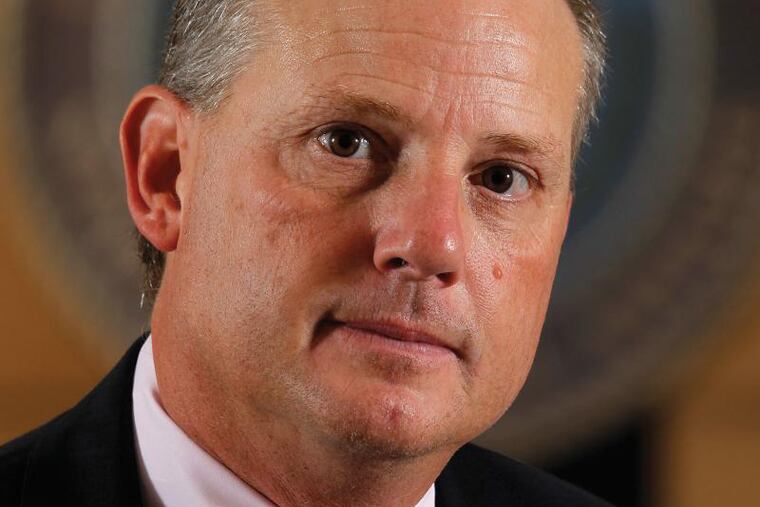Does this liberal chief justice have a cure for corporate America?
Strine’s legal reform program for U.S. business — listed in a paper titled “Toward Fair and Sustainable Capitalism” — go beyond interpretation of existing law.

Leo E. Strine is a “liberal with a capital L,” says Larry Hamermesh, a veteran Widener Law prof who co-teaches a seminar on Delaware law with Strine at the University of Pennsylvania Law School.
Strine is also one of the top business arbiters in America. As Delaware’s chief justice — he’s stepping down this year — Strine oversaw appeals that rose to the state’s top court from the business-friendly Delaware Court of Chancery, where he earlier sat on the bench.
Delaware judges aren’t elected, as in Pennsylvania. They are chosen by governors and confirmed by state senators, who are well-aware that fees from companies that prefer to have their legal fights settled in Delaware — more than half of major U.S. companies — fund one-quarter of the state’s yearly budget. A real radical might drive away business, which could force the state to impose a dreaded retail sales tax, as if it were Pennsylvania, or New Jersey.
But Strine’s 18-point legal reform program for U.S. business — listed in a paper titled “Toward Fair and Sustainable Capitalism” and lately posted by the Penn and Harvard law schools — goes beyond interpretation of existing law.
His points sound “more like [Democratic presidential candidate and U.S. Sen.] Elizabeth Warren (D., Mass.) than the former chancellor heading up Delaware’s top business court” in Joe Biden’s home state, suggests Greg Lavelle, who led the Republican minority in Delaware’s state Senate until he lost his seat last fall.
Is Strine auditioning for a job — maybe a U.S. Supreme Court seat — if the Democrats regain control in Washington?
The chief justice is shy about his plans, so I asked his classroom partner. “Gosh, who wouldn’t want to serve on the U.S. Supreme Court? But I don’t think this is part of an elaborate plan” to get Strine on the top bench, says Hamermesh, professor emeritus at Widener Law School and executive director of the Institute for Law and Economics at Penn Law.
Strine writes papers because “he genuinely cares about policy,” Hamermesh told me. Before he was a justice, Strine was an aide to then-governor, now U.S. Sen. Tom Carper (D. Del.) “One of his heroes is Lyndon Johnson,” who signed the key civil rights laws of the 1960s.
But, he added, when it came to judging corporate cases, Strine is all law: “He has a track record of being a very sensitive articulator,” respecting the material interests and legal precedents in a case. "He understands investors and return on investment and economic law and finance.”
Strine’s “major contribution in advancing law is that, if stockholders [with] full information knowingly approve some deal,” interested parties have little basis to complain about it or indulge in lengthy litigation based on after-the-fact fiduciary argument, Hamermesh concluded. Strine’s October 2015 opinion in a landmark case “acknowledged that stockholders are grown-ups. They know when they mean to say ‘no.’ They don’t get to say ‘nevermind’ later." That’s a simplifying position that conservative managers exasperated by endless litigation costs can appreciate.
The chief justice’s proposals:
He would “require large, socially important companies to annually report on their businesses’ impact on workers, consumers, communities, the environment, and our nation,” and add quarterly social-impact statements to a company’s sales and profits guidance.
He would create German-style “workforce committees to address workforce issues on the board level.”
And he would make companies measure and report “human capital” just like investment capital. (I ran that by veteran corporate auditor John McLaughlin, who owns the Newtown Square-based Audit Exchange. That would be tough to implement, McLaughlin said: “It would require entirely too much judgment” by bosses and auditors. Plus, the value of brain work is already baked into companies’ share price, he said.)
Strine also proposes requiring pension funds, mutual fund operators such as Vanguard Group, and college endowments to consider the impact of the companies they invest in on their clients, and explain how their votes on corporate issues advance “ethical, environmental, social and government goals"; and to require an SEC study on the “investor protection risks” from big private investors who don’t disclose their true owners.
He would establish a financial-transaction tax — half a percent of the value of stocks that are sold, one-tenth of a cent for bonds, a small fraction for swaps and other derivatives. He would force investors to earn capital gains over a period of at least five years before qualifying for the capital-gains tax discount.
Strine also supports some reforms that might entrench management. He would require activist hedge funds to say more about their stake in the companies they target for cost-cutting and other hostile changes; and require shareholders to have “a genuine stake in the company” before submitting economic proposals for a shareholder vote.
In a symposium I attended at the Penn Law School earlier this year, Strine praised Sen. Warren’s support for measures forcing corporations to measure the impact of their actions on the public, and decried other Democrats’ close ties to hedge fund donors.
“This system is in need of an upgrade,” acknowledged Jay Clayton, the affable Wallingford native who serves at President Trump’s SEC chairman, at that same symposium. But instead of a lot of new rules, wouldn’t it “make everybody happy” to help companies invest more, boosting profits and hiring?
“Working people who do the vast amount of the labor are not being rewarded,” Strine stressed. The law should encourage companies to spend more on people. And he wanted the government to make it easier for workers to unionize, pressuring bosses the old-fashioned way.